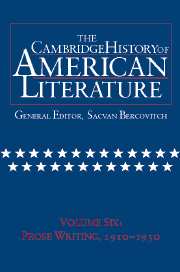Book contents
- Frontmatter
- Introduction
- A Cultural History of the Modern American Novel: Introduction
- 1 A Dream City, Lyric Years, and a Great War
- 2 Fiction in a Tme of Plenty
- 3 The Fate of Writing During the Great Depression
- Fictions of the Harlem Renaissance
- 1 A New Negro?
- 2 Black Manhattan
- 3 Avatars and Manifestos
- 4 Harlem as A State of Mind: Hughes, McKay, Toomer
- 5 A New Negro, A New Woman: Larsen, Fauset, Bonner
- 6 “Dark - Skinned Selves Without Fear or Shame”: Thurman and Nugent
- 7 Genre in The Renaissance: Fisher, Schuyler, Cullen, White, Bontemps
- 8 Southern Daughter, Native Son: Hurston and Wright
- 9 Black Modernism
- Ethnic Modernism
- Chronology
- Bibliography
- Index
8 - Southern Daughter, Native Son: Hurston and Wright
from Fictions of the Harlem Renaissance
Published online by Cambridge University Press: 28 March 2008
- Frontmatter
- Introduction
- A Cultural History of the Modern American Novel: Introduction
- 1 A Dream City, Lyric Years, and a Great War
- 2 Fiction in a Tme of Plenty
- 3 The Fate of Writing During the Great Depression
- Fictions of the Harlem Renaissance
- 1 A New Negro?
- 2 Black Manhattan
- 3 Avatars and Manifestos
- 4 Harlem as A State of Mind: Hughes, McKay, Toomer
- 5 A New Negro, A New Woman: Larsen, Fauset, Bonner
- 6 “Dark - Skinned Selves Without Fear or Shame”: Thurman and Nugent
- 7 Genre in The Renaissance: Fisher, Schuyler, Cullen, White, Bontemps
- 8 Southern Daughter, Native Son: Hurston and Wright
- 9 Black Modernism
- Ethnic Modernism
- Chronology
- Bibliography
- Index
Summary
Zora Neale Hurston appeared to be the coeval of Anna Bontemps, another ambitious black college student who migrated to Harlem. As it turns out, the anthropologist-author, known for her fondness for trickster stories (and trickster behavior), was not born in the new century, as she led people to believe, but in 1891. She became well known for her shenanigans: Langston Hughes’s story of how she took a nickel from a blind man’s cup for the subway fare is Renaissance lore. Hurston trained in anthropology and folklore at Barnard College and Columbia University after initiating her studies at Morgan State. As she wrote in the very first sentence of Mules and Men (1933), “I was glad when somebody told me, ‘You may go and collect Negro folklore.’” To perform such work would validate her own origins as an African American. In addition, her training as a scholar enabled her to look more dispassionately on her upbringing, and see it more clearly than the one who never steps outside of her culture. Part of her love for her own people and place lay in her recognition of the richness of black American oral literature. Born and raised in the Deep South, Hurston lived a childhood that fellow Renaissance scribes Fauset, Larsen, Toomer, and Fisher could only imagine. Hurston declared herself a real Southerner, proudly proclaiming she had “the map of Florida on her tongue.”
- Type
- Chapter
- Information
- The Cambridge History of American Literature , pp. 340 - 347Publisher: Cambridge University PressPrint publication year: 2002



